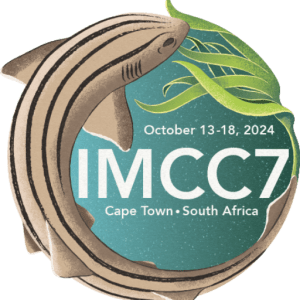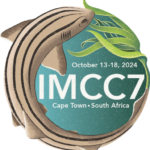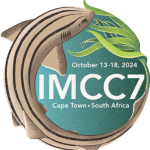Call for Abstracts
More submission information coming soon!
Please review the following list of accepted symposia and session types:
To present during a closed symposium, you must have already been in discussion with a symposium lead.
OECMs: Opportunities for expanding marine protection in South Africa
Understanding Human-Ocean connections and values: Actioning the UN Ocean Decade – Symposium 1 (part 1 of 2)
Understanding Human-Ocean connections and values: Actioning the UN Ocean Decade – Symposium 2 (part 2 of 2)
Equity Waves: Navigating Blue Justice for Sustainable Seas
How to better centre ocean equity in marine science
Finding consensus areas for protection on the high seas
Using expected outcomes of Marine Protected Areas to inform and improve biodiversity conservation: Assessments using The MPA Guide
A panel discussion on the status of the Southern Benguela marine ecosystem – what is really going on in this once highly productive ecosystem?
Beyond Funding: Rising to the challenges of supporting actionable ocean science
Indigenous-led Ocean Conservation on Canada’s Pacific Coast – the Great Bear Sea MPA Network – Part One – Overview
Indigenous-led Ocean Conservation on Canada’s Pacific Coast – the Great Bear Sea MPA Network – Part Two – Implementing the Network
Building the scientific case for high seas marine protected areas
Anyone may request to present as part of an open symposium, and symposium leads will select those that best fit their needs. If you are not accepted into an open symposium, your talk will be placed into another session type from the list below.
Seas of Sustainability: Advancing Marine Stewardship in the Indian Subcontinent
Citizen Science for Marine Conservation
A Conceptualization of Illegal, Unreported, and Unregulated (IUU) Fishing Across Spatiotemporal Scales
Beyond the status quo: defining and enabling a sustainable deep-ocean blue economy
Using marine biodiversity knowledge to inform conservation action – Progress from national assessments
Sustained Engagement Across Scientists, Managers, and Communities is Essential to Foster Climate-Resilient Fisheries
Exploring Nature Positive Pathways for Marine Conservation
Learning about Ocean Defenders through Global Case Studies
Improving Effectiveness of Marine Protected Areas with SMART and other integrated conservation technology
A better resilient future: Join us on the coast of innovation as we explore the synergy between Ecosystem-Based Adaptation, Marine Protected Areas, and Coastal Communities
Building Partnerships for Climate-Resilient MPAs
Science-Based Targets for Ocean Industries: Establishing the science to engage corporate action on ocean conservation
Progress, barriers, and opportunities to achieving the 30×30 target in the Western Indian Ocean
Transboundary threats and conservation of sea turtles
Visions for an integrated marine science community
Tangible actions to tackle marine pollution
Facilitating dialogue in support of Small-Scale Fishers in the western Indian Ocean region
Successful examples of estuarine restoration: Science-based strategies and hope for the future
Beyond “30×30”
Marine conservation conflict in coastal metropoles
The use of earth observation for marine and coastal conservation and decision support
Open symposium on Ocean Fluency in the Western Indian Ocean: Experiences and
Practicalities from Kenya and South Africa
Empowering Oceans: Building Conservation Capacities in Developing Nations
Oceans for all: Open symposium on DEI in ocean practice
Putting sharks in the parks: sharing lessons in spatial planning to accelerate shark conservation
Charting a Course for Collaborative Interdisciplinary Innovation in Marine Conservation and Stewardship
Creating a community-led marine plan in western, Newfoundland Canada to protect and connect the health of our ocean and coastal communities
From base pair to genome: current applications for marine conservation
Methods and approaches for Nature and People Positive Oceans
When submitting your abstract for review, you will be asked to please select the session type that best fits your talk, along with a second and third choice. This will be used to group similar talks together into sessions and will facilitate abstract review. Please note that your talk may be placed in a different session depending on available space.
Blue Economy: This theme is for talks including those focusing on the conservation implications of marine tourism, shipping, alternative energy related to the ocean and coasts, and mining impacts.
Climate Change and Ocean Acidification: Talks about research or policy related to climate change or ocean conservation, including impacts or mitigation.
Conservation and Management Policy: Talks that are about new developments in conservation-relevant regulations and laws, as distinct from policy-relevant research.
Endangered and Threatened Species: Talks that are specifically about the science or practice of endangered or threatened species conservation.
Fisheries and Aquaculture: Talks about the science, practice, or management of fisheries and aquaculture, including but not limited to the development of sustainable fisheries.
Habitat Conservation and Restoration: Talks about the science or practice of protecting or restoring marine and coastal habitats without a species-specific focus.
Human Dimensions of Ocean Conservation: This topic includes a variety of topics including but not limited to stakeholder knowledge attitudes and practices, ocean literacy, marine conservation education, and communicating marine conservation, and socioeconomic interventions. Indigenous knowledge, attitudes, and practices are under a separate category.
Local and Traditional Ecological Knowledge: This theme includes Indigenous knowledge and practices in marine science and conservation, as well as cultural heritage.
Marine Pollution: This theme includes talks about pollution as a threat to marine biodiversity as well as solutions to this problem.
Ocean Science and Conservation Technology: Talks about new developments related to ocean conservation technology including testing and development.
OceansOnline: Talks related to the use of online tools for marine conservation research, collaboration, or education. (Please note that in past IMCCs, these talks have all taken place on a different day from the rest of IMCC, but at IMCC7 they will be interspersed throughout the conference).
Participatory Marine Conservation and Community Science: Talks related to involving members of the community in marine conservation research and management.
In addition to these topical themes, there are a few other categories of talk:
General Marine Conservation: Any talk relevant to the science or practice of marine conservation that does not neatly fit into one of the other topics.
Speed Talks: 3-minute talks about any talk related to marine conservation science or practice, designed for early stage projects. Abstracts submitted as a full talk may be assigned a speed talk by abstract reviewers
The 7th International Marine Conservation Congress
OCTOBER 13-18, 2024
CAPE TOWN, SOUTH AFRICA



